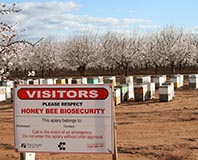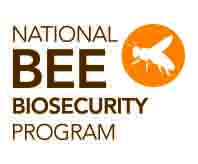Read the latest information on
Foot-and-mouth disease

Bee Biosecurity Officers will be available in five states to help beekeepers to implement biosecurity measures in their apiaries. Photo: Trevor Monson, Australian Pollination Services
Beekeepers in NSW now have an advisor on hand to help them keep their hives free from pests and diseases.
Hayley Pragert has started work in the new role of Bee Biosecurity Officer as part of a joint industry–government initiative to look after Australia’s honey bees.
Alison Saunders, Horticultural Cropping Manager at Plant Health Australia (PHA), said that the new program is a world first initiative that all partners should be proud of.
“PHA’s Bee Biosecurity Program, which includes the appointment of Bee Biosecurity Officers nationally, has been well received,” Alison said.
“The Australian Honey Bee Industry Council and the NSW Department of Primary Industries (DPI) have both been willing contributors, together funding Hayley to work with NSW beekeepers to help protect our valuable honey bees.”
Kathy Gott, Plant Biosecurity Strategy and Planning Manager at NSW DPI, said supporting honey bee biosecurity was vital to ensure a thriving industry.
“As the NSW Bee Biosecurity Officer, Hayley will be responsible for training beekeepers and demonstrating best practice beekeeping at field days and other agricultural events, as well as raising awareness of pests and diseases that can harm honeybees,’ Dr Gott said.
 “Her role will also promote the National Bee Biosecurity Code of Practice, which outlines measures for beekeepers to minimise risks and engage in best-practice biosecurity.”
“Her role will also promote the National Bee Biosecurity Code of Practice, which outlines measures for beekeepers to minimise risks and engage in best-practice biosecurity.”
Casey Cooper, Vice-President of NSW Apiarists’ Association, said that the new officer has plenty of hands-on experience.
“Hayley is passionate about bees. She’ll be able to give advice to NSW beekeepers on how to recognise and deal with pests and diseases like small hive beetle and the bacterial disease American foulbrood, both of which can damage hives.”
“She will also help to protect against serious exotic pests like Varroa mite by setting up a network of beekeepers who survey hives for exotic pests. Early detection and reporting of any new pests would be fundamental to eradicating it,” he added.
Since the NSW Bee Biosecurity Officer is being appointed as part of a national program, Hayley will soon have access to similar officers based in every state in Australia to work on protecting Australia’s honey bee industry and pollinator-reliant crop industries.
There is more at stake than Australia’s honey industry, which is why PHA is managing the efforts to boost bee biosecurity. PHA has been the facilitator of honey bee biosecurity projects because of the importance of honey bees not just to the honey industry but also to crop producers, since honey bees increase yields and quality in many fruits and vegetables.
For more information on honey bee biosecurity visit www.beeaware.org.au